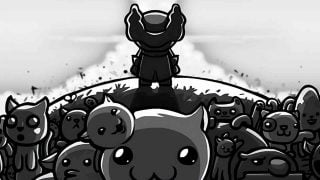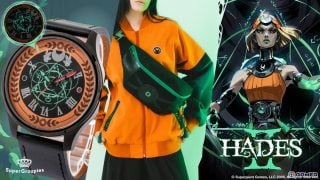I’ve never been one to believe in love at first sight. To me it always seemed a superficial affection based on skin-deep appearance, whether in romance, food or… well, video games. I’m of the mind that to truly love and appreciate something, you have to learn its facets, sink yourself into it, really learn what it’s about. But there was one occasion where I experienced love at first sight firsthand.
Five years ago today I ventured to my local GameStop to pick up a new Wii JRPG. I knew almost nothing about it, other than the lengths people online had campaigned to bring the game over to the US. I was always ready to support such efforts (mostly because of a certain unlocalized title that rhymes with “Brother Free”), so I bought this new game on launch and brought it home, only knowing that it was critically praised and much sought after. Upon opening the box, I noticed the inverse cover was a breathtaking sight:

It was a piece of game art the likes of which I had never seen. I was immediately dazzled, and popped the disc into my Wii at a moment’s notice. With mild anticipation, I hit the title screen and the game’s Main Theme began to play. I sat there, looking at the exceedingly simple shot of the Monado set across a vast plain as day turned to night, and the song proceeded. The swells of emotion struck me deep, and before I knew it I was tearing up.
Xenoblade Chronicles, to this day, is the only game that’s made me cry before I even pushed start.
Were the game to end at just that one title screen, I could probably mark it as a brief yet flawless masterpiece and move on. Yet it was all the better that the full game not only matched the majesty of that moment – it exceeded it, proving to be not only the greatest JRPG of the last generation, but one of the finest games of all time.
A blade of destiny
Xenoblade wastes no time in embroiling the player in the narrative. Immediately we are told the premise – of a world of two titans, locked in conflict long ago. On one side stands the alabaster Bionis, progenitor of organic life, while on the other lies Mechonis, origin of the mechanical. Long since frozen in place mid-combat, now the creatures born from the titans are fighting their own conflict, as the cold machines of Mechonis, known as Mechons, regularly invade the lush Bionis. After a brief introductory sequence that flashes back to a great battle between the two forces, the player takes control of Shulk – an intelligent, somewhat reserved youth who studies the Monado, the only weapon that can wound Mechons, and thus his people’s only hope of defending their peaceful colony.

Describing just about anything beyond that point would constitute a spoiler, but to simply say that Xenoblade has a good story is a disservice to the breadth of its narrative greatness. The game not only expertly weaves a well written story full of unexpected twists and turns, it sports top-notch, truly original world-building; a vast and varied pool of NPCs; and thoroughly explored themes of revenge, loss, and what the future holds.
Which is to say nothing of the cast, which stands as one of the strongest in any RPG ever. Shulk himself is a delicately written hero who manages to come across as both brave and unsure of his actions, demonstrating great growth in his personal journey across the two titans. He’s joined by his childhood friends Reyn and Fiora, the wounded hero Dunban, caring medic Sharla, dignified mage Melia, and – truly the greatest of them all – the heropon Riki, the most daring and brave Nopon in existence. Their interactions make for wonderful character building, amplified by the game’s unique heart-to-heart system that allows for both tender and personal scenes as well as more goofy, lighthearted moments.

This is also one of the few Nintendo games that offers truly great voice acting. Originally localized in Europe, the title features a range of British voice actors who normally wouldn’t get a chance to shine in American localizations – and they do a stupendous job. While they offer some great performances in cutscenes, their true mastery comes from their battle dialogue, which remains some of the most quotable out of any game ever. I’ve held entire conversations with friends that were just espousing quotes from Xenoblade back and forth at each other (most of them courtesy of Reyn).
Describing every development in the story and how it all comes together to form a wonderful narrative would be foolish, but simply know that Xenoblade understands the heart and soul of its world and its characters with a fine precision that few games can match. It can make you laugh, or feel hatred, or shed tears in such a way that it makes it look easy.
Wide world
At a glance, Xenoblade’s graphics may look… muddy. Its resolution isn’t of the highest fidelity, and there are certainly moments where it shows its age. Yet what it lacks in pixels it more than makes up for in environmental and world design. Many fantasy worlds attempt to feel unique while at best coming off as quasi spin-offs of Lord of the Rings. Xenoblade, meanwhile, manages to use its creative setting to create a truly compelling and special world.
Part of this greatness stems from the game’s mastery of scale. While other games attempt to create the feeling of hugeness through large open worlds or sheer density of quests. Xenoblade instead utilizes a variety of lush and titanic environments to convey the size of its world – from the grandeur of Gaur Plains to the deep blue of Eryth Sea to so many more locales, the game manages to feel massive without ever becoming too daunting. Exploring most areas will take hours, but the range of monsters, environments, and landmarks you’ll find are original enough to make you excited the entire way.

What truly makes Xenoblade’s world come alive, however, is the vast affinity chart. A massive interconnecting map of all the game’s named NPCs (of which there are hundreds), it’s a grand way of chronicling the huge number of sidequests the game has to offer. Doing important or influential quests will affect the affinity chart, changing the relationship between NPCs involved in the quest – for better or for worse. It’s a small yet important way in which the game makes the player feel responsible for their actions, as doing a lot of quests in an areas will usually improve the lives of the denizens there.
And while the game’s art direction and design are fantastic, even loftier praise must be reserved for the music. With nearly a hundred tracks that offer everything from quiet hymns to reflective violins to blaring metal and more, it is without a doubt one of the finest soundtracks across the entire medium. Listen to it yourself if you have the time – nearly every song is a joy to listen to, and picking a favorite is nearly impossible.
Clairvoyant combat
Xenoblade doesn’t play like typical JRPGs, instead adopting a loose combat system fairly similar to most MMOs. Characters will automatically attack if in range of the enemy, and you instead determine when they use their special abilities (known as arts). Arts have cooldown, meaning you can’t spam them recklessly – instead you have to carefully choose where and when to execute them.
Like all good combat systems, it seems simple on the surface but holds a great amount of depth to it. Different characters have different roles in the party – Shulk deals big damage, Reyn draws enemy fire, Sharla heals, etc. There are also a limited number of arts characters can equip at one time, leading to tactical decisions when it comes to their loadouts. Adding to this is the game’s Break/Topple/Daze system, which offers a way of comboing your enemy to momentarily disable them. Add in some extra rubs like ether damage, positioning bonuses, and chain attacks that utilize your entire squad, and there are plenty of wrinkles that make the battle system truly interesting and – once again – special.

The game’s equipment system is also fun. Changing characters’ armor and weapons actually changes their appearance (which, when silly enough, may ruin a cutscene or two). Equipping gems can boost certain stats or offer certain attributes not normally found, giving you an edge in battle. Crafting gems was a process unto themselves, and a fun way of boosting affinity between party members (though managing resources can get a bit cluttered).
The most standout aspect of the game’s battle system, however, is clairvoyance. Using the Monado’s power to see the future, Shulk can predict attacks by the enemy that would prove fatal or otherwise severe, giving the player a chance to stop the attack before it happens by utilizing the arts they have available to them. It’s a clever integration of story and gameplay, and makes it so most strong enemy attacks don’t feel cheap or overpowered – you have a chance to respond to them beforehand, so if you fail to stop it it’s generally your fault.
There are plenty of other intricacies that could be explored more in depth, but the bottom line is that Xenoblade’s combat manages to feel strategic and fluid at the same time – a rare combination not just in the genre, but in most games. It’s not the most action packed or intense, nor the most complex, but it manages to strike such a fine balance that it never feels like a drag or detriment on the experience in the slightest.
The future is ours to decide
Until last month, when Breath of the Wild barely eclipsed it, Xenoblade Chronicles offered the longest single player experience of any game I had ever played. At over a hundred hours I had fully immersed myself in the world, its characters, and scrounging up materials to rebuild Colony 6. It took months of real world time to go through the experience bit by bit, piece by piece – yet when it had finished, I felt a sense of fulfillment that so few games achieve.
There are few games I love as thoroughly as Xenoblade. It has its odd flaw here and there, of course, but when I think of the breadth of the experience, the lands I had explored, the journey I had taken with all the characters… it makes me emotional.
Love at first sight can end up making you feel disappointed after your initial impression gives way to a less perfect picture. Xenoblade Chronicles was something much more special than that. I fell in love from the first moment, and kept that affection all the way from beginning to end. It is one of the few games I will recommend to anybody and everybody. And even now, I still remember that day five years ago when I bought it on a slight whim. I could never have predicted the future that lay in store for me.



